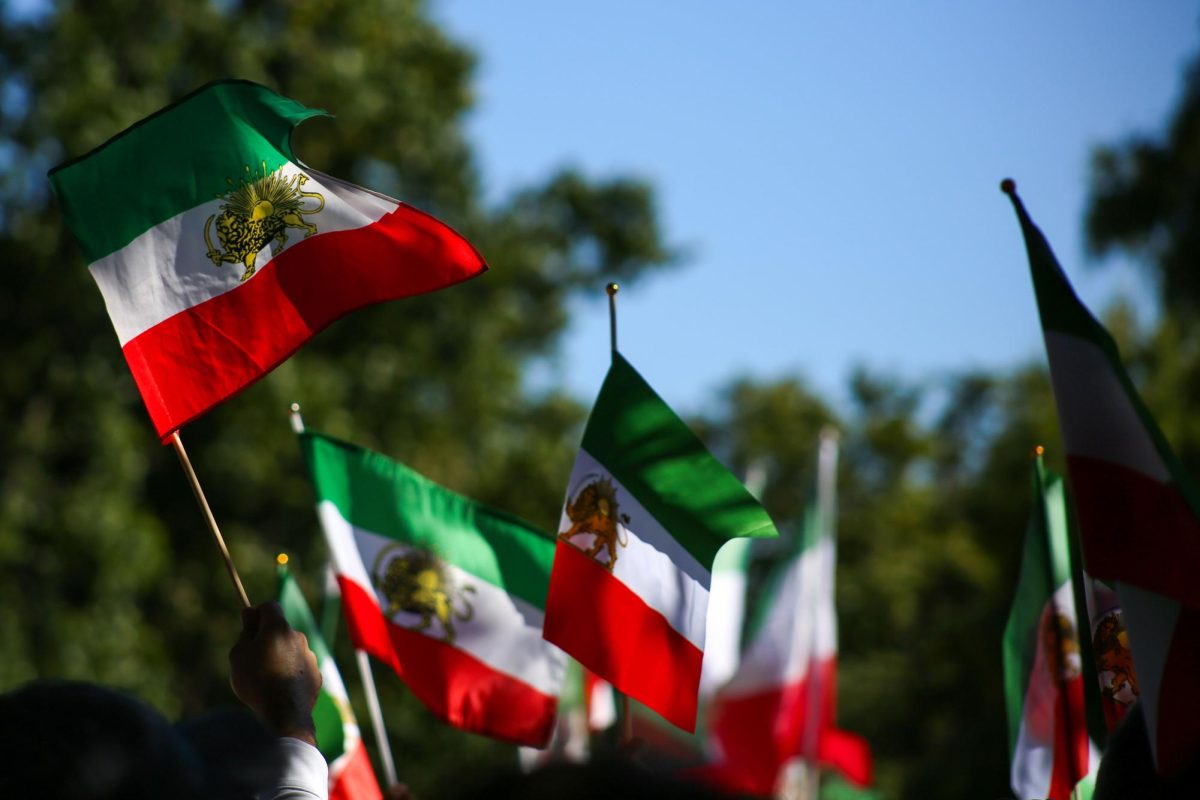Protesters gathered to demonstrate support for women’s rights in Iran and to remember the death of Mahsa Amini at Lafayette Park Saturday.
Nearly 300 protestors, including GW students, marched down 17th Street to protest the Iranian government’s repression of women’s rights and speech on the anniversary of the death of Mahsa Amini, an Iranian feminist activist. Students said they attended the demonstration, organized by the National Solidarity Group of Iran, to show support for Iranian women and urge action from the American public and government.
The event featured 10 speakers from various Iranian human rights advocacy backgrounds, including some who had spent time in Iranian prisons for their work. Demonstrators and speakers chanted slogans in support of the women’s rights movement, like “Women, Life, Freedom,” and in opposition to the Islamic Republic of Iran, including “Death to the Islamic Republic” — many waving the historic lion and sun flag of Iran, a symbol of opposition to the regime.
Mahsa Amini was an Iranian-Kurdish woman who was hospitalized and later died in Tehran after members of Iran’s religious morality police allegedly fatally beat Amini for not wearing a hijab, or religious headscarf, in public. Her death sparked an ongoing movement in Iran for women’s rights, secularism and freedom of speech under the slogan “Woman, Life, Freedom.”
Sophomore Sophie Mansuri, a GW student studying journalism and mass communication, said she felt obligated to speak up for women in Iran through protesting. She also said she felt a “personal” connection to the issue because her whole family was exiled from Iran during the 1979 revolution and because she is similar in age to Amini.
“We’re not going to sit down or be quiet — we have the right here in the U.S. to speak up, protest and make some kind of change,” Mansuri said. “It’s a very personal cause for me, it is very emotional, especially since Masha Amini was twenty-two when she was killed and I am almost twenty.”
Sophomore Persia Zurita, a GW student studying international affairs, said she protested to demonstrate that GW and the wider D.C. community “stand with” the women of Iran. She said Iranians need to know that human rights reform is possible.
“It’s really important that D.C. shows solidarity with the women of Iran,” Zurita said. “We’re all here to show to everyone in Iran that freedom can be attainable and we will do our best to make it attainable.”
Zurita also said repeated demonstrations in the U.S. over the past year have pressured the House of Representatives to pass the Mahsa Amini Human Rights and Security Accountability (MASHA) Act, which will impose further sanctions on regime figures including Supreme Leader Ali Khamenei and President Ebrahaim Raisi. She said she hopes more protests result in increased reforms.
“Because of these demonstrations we have had some response from Congress: the MASHA Act just passed the House this last week and we are hoping to get the Senate to pay attention to our voices,” Zuria said. “People in Iran should not be killed for trying to get basic rights.”
Rana Mansour, an Iranian-American musician and a speaker at the demonstration, said increased cooperation and unity within the opposition is needed to push for change. She said “division” within the opposition has strengthened the regime and its longevity in the past.
“The only way the Islamic Republic has stayed in power for 44 years is to oppress and rule, to divide and rule,” Mansour said. “As long as we continue to be divided and they are united, they will stay in power.”
Aundia MehrRostami, an Iranian-American demonstrator, said she was protesting for the women of Iran but also for her family, including her father, who protested against the Iranian Revolution that established the current regime. She also said advancing women’s rights in Iran promotes human rights across the globe.
“This fight is an ongoing fight for the liberation of the Iranian people,” MehrRostami said. “We will not let Mahsa or any of the martyrs die in vain.”
Cade McAllister contributed reporting.





